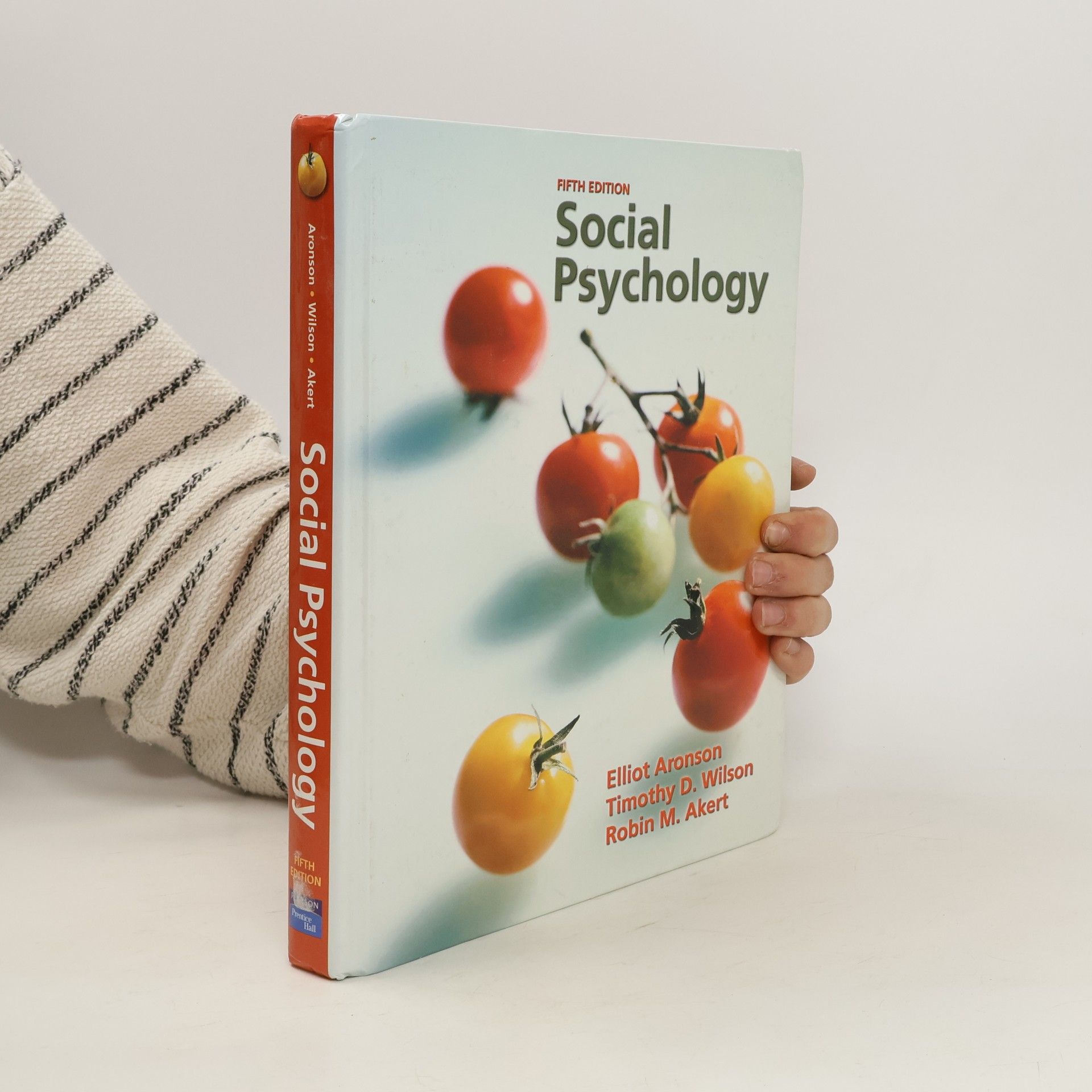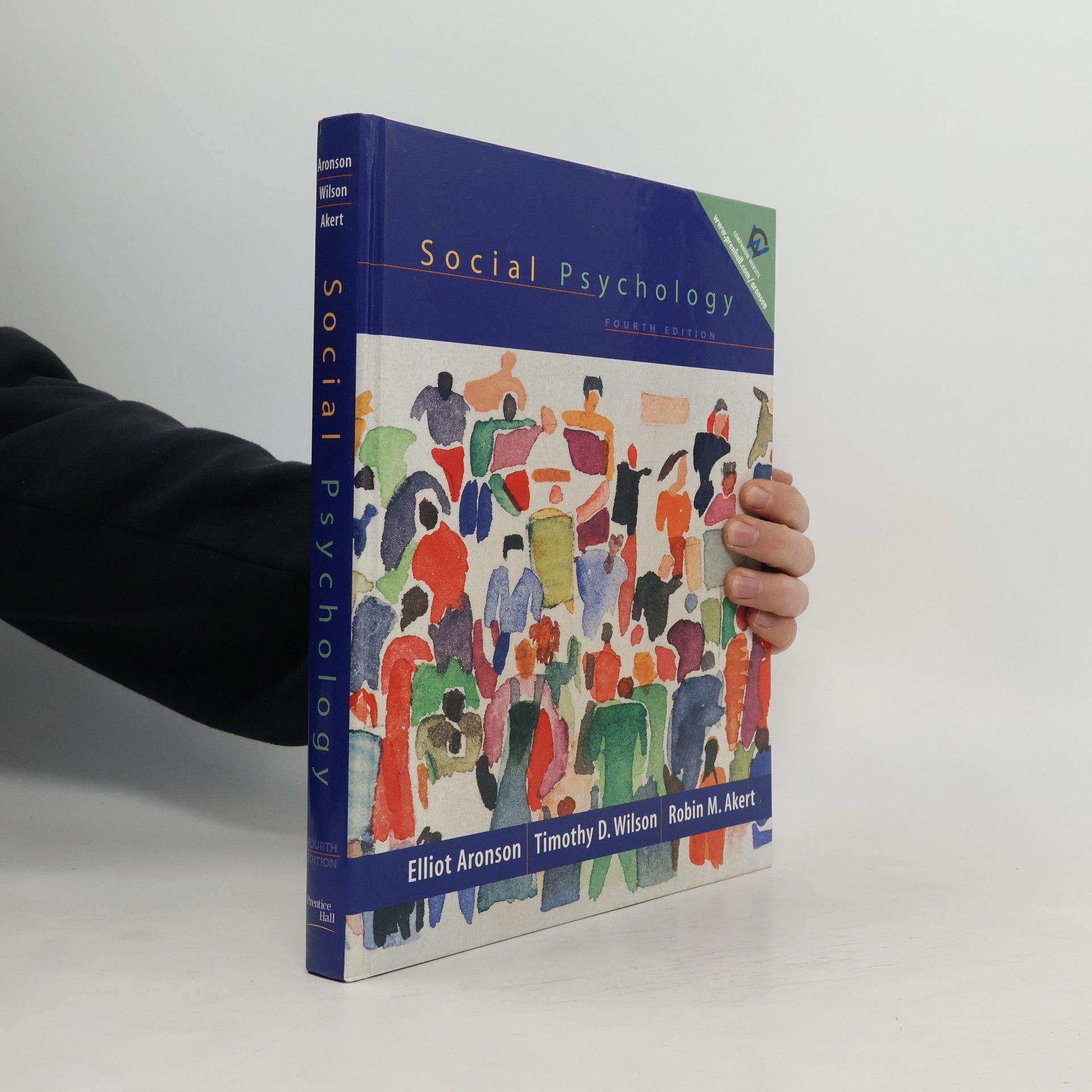Tvor společenský
- 492 stránek
- 18 hodin čtení
Elliot Aronson patří mezi nejpozoruhodnější a nejvíce všestranné psychology současnosti. Jeho kniha je úvodem do studia sociální psychologie.
Elliot Aronson je uznávaný psycholog, jehož práce se hluboce zabývá lidským chováním. Je známý svými průkopnickými studiemi kognitivní disonance a metodou skládačky, které změnily naše chápání sociální psychologie. Aronsonovo psaní se vyznačuje jasností a hloubkou, díky čemuž jsou jeho teorie přístupné širokému publiku. Jeho celoživotní dílo ovlivnilo generace psychologů a jeho vliv je patrný v jeho rozsáhlých učebnicích a výzkumu.







Elliot Aronson patří mezi nejpozoruhodnější a nejvíce všestranné psychology současnosti. Jeho kniha je úvodem do studia sociální psychologie.
Proč omlouváme svoje hloupé názory, chybná rozhodnutí a špatné skutky
Proč se lidé tak vehementně vyhýbají odpovědnosti, když se věci začnou brát špatným směrem? Proč před námi neustále defilují zástupy politiků, kteří za žádných okolností nechtějí připustit své chyby a donekonečna se vykrucují? Odpověď na to, proč jsme schopni odhalit pokrytectví u ostatních, nikoli však u sebe, přináší tato kniha. Carol Tavrisová a Elliot Aronson, dva světově proslulí sociální psychologové, tento problém dlouho studovali a na příkladech psychologických experimentů i reálného života nám nabízejí vysvětlení mechanismu sebeospravedlňování. Kde se rodí, jak funguje a jaké škody může způsobit. Po přečtení knihy mimo jiné pochopíme, proč nemáme rádi lidi, kterým jsme ublížili, proč jsou partnerské krize často obtížně řešitelné, proč policie a soudy tak často odmítají propuštění nevinně odsouzených – všichni, kteří se dopustili chyb, by museli uznat, že chybovali právě oni. Dobrá zpráva na konec – jsme-li si mechanismu sebeospravedlňování vědomi, dokážeme se mu snadněji vyhnout.
Intended for an undergraduate introductory level course in social psychology, this text uses a story-telling approach to convey the science of social psychology. Its aim is to help students understand the whole context of the field - how theories inspire research, why research is performed as it is, and how further research triggers new avenues of study - and how all of this impacts their everyday lives. It incorporating real-life vignettes and mini stories within every chapter that include detailed descriptions of classic and modern experiments, and describe an example of a real-life phenomenon.
This book, written by distinguished authors, presents a detailed, rigorous and scientific approach to social psychology aimed at students and faculty alike.
Shares findings from research on the effectiveness of various persuasive messages, provides an overview of what social psychologists and other investigators have learned about how people are persuaded, analyzes common propaganda tactics, and explains what people can do to limit the effects of propaganda in their lives
Exploring the most important ideas in social psychology, this collection of classic and contemporary readings includes accounts of specific experimental findings as well as more general articles summarizing studies on such topics as attraction and aggression. In this edition, the most significant and provocative articles of earlier editions have been retained, including such classics as Stanley Milgram on obedience and Solomon Asch on conformity. Organized to illustrate the major themes of Elliot Aronson's highly praised book, The Social Animal, this acclaimed collection of articles can readily be adapted for use with any introductory text, or even in lieu of a text.
WYBITNA KSIĄŻKA BESTSELLEROWEGO AUTORA I GENIALNEGO NAUKOWCA ELLIOTA ARONSONA. „Tavris i Aronson połączyli swoje umiejętności, aby stworzyć wspaniały wzorzec przenikliwości społecznej i naukowego zaangażowania. Nie popełnij błędu, musisz przeczytać tę książkę” – Robert B. Cialdini. Dlaczego ludzie uchylają się od odpowiedzialności, gdy wszystko się wali? Jakie mechanizmy prowadzą do niekończących się kłótni małżeńskich? W tej niezwykle wnikliwej książce psychologowie Carol Tavris i Elliot Aronson badają samousprawiedliwianie. Kiedy popełniamy błąd, musimy złagodzić dysonans poznawczy, co prowadzi do tworzenia fikcji, które uwalniają nas od odpowiedzialności. Autorzy przedstawiają fascynujące wyjaśnienie zjawiska samooszukiwania, jego mechanizmów, skutków oraz sposobów na uwolnienie się od niego. „To urocza, zachwycająca książka. Tavris i Aronson wyjaśniają, jak wszyscy utwierdzamy się w przekonaniu, że mamy rację, mimo dowodów na przeciwną” – Daniel Gilbert. „Książka ta nie zmieni nas w anioły, ale jest doskonałym przewodnikiem po diabelskich sztuczkach umysłu” – David Callahan. Elliot Aronson podkreśla, że książka ta odzwierciedla jego poczucie domknięcia kręgu życia i hołd dla mentora, Leonarda Festingera.
„Przypadek to nie wszystko. Moje życie psychologa społecznego” Elliota Aronsona, uznawanego za jednego z najważniejszych uczonych XX wieku w dziedzinie nauk społecznych, to pełna pasji opowieść o jego życiu i czasach, w których żył. Autor, obdarzony otwartością, dowcipem i wyjątkowym zmysłem obserwacyjnym, przedstawia wydarzenia takie jak Wielki Kryzys, walka o zniesienie segregacji rasowej czy ruchy hipisowskie, w które aktywnie się angażował, niejednokrotnie wpływając na ich bieg. Aronson opisuje te epizody z perspektywy zarówno uczestnika, jak i biegłego analityka, ukazując złożoność procesów społecznych. W książce nie brakuje również refleksji na temat postaci, które ukształtowały współczesną psychologię społeczną, takich jak Abraham Maslow, Jerome Bruner, David McClelland i Leon Festinger. Autor nie boi się ujawniać swoich sympatii i antypatii, co dodaje narracji autentyczności. Barwny i żywy język sprawia, że lektura jest wciągająca, czyniąc tę książkę znakomitym wyborem nie tylko dla pasjonatów psychologii, ale także dla każdego, kto pragnie lepiej zrozumieć współczesny świat.